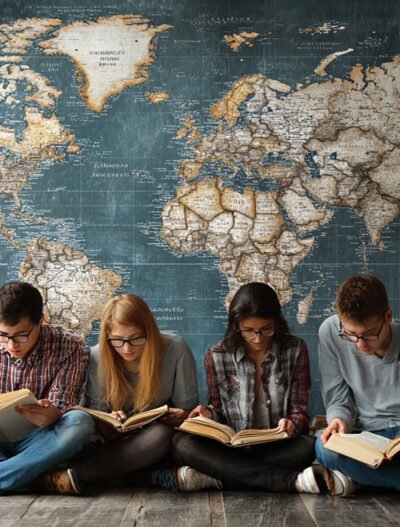 Have you ever wondered why so many people describe studying abroad as “life-changing”? For students and lifelong learners alike, the intersection of education, travel, and culture offers opportunities far beyond the classroom. In today’s interconnected world, where global understanding and cultural empathy matter more than ever, studying abroad has become more than just a personal adventure—it’s a pathway to growth, perspective, and future success.
Have you ever wondered why so many people describe studying abroad as “life-changing”? For students and lifelong learners alike, the intersection of education, travel, and culture offers opportunities far beyond the classroom. In today’s interconnected world, where global understanding and cultural empathy matter more than ever, studying abroad has become more than just a personal adventure—it’s a pathway to growth, perspective, and future success.
Beyond academics, the experience of living in another country transforms how you see the world. It pushes you out of your comfort zone, reshapes your worldview, and equips you with skills and insights that will last a lifetime.
The Role of Education in Global Understanding
Education has always been the foundation of personal and professional development, but when paired with international experience, it takes on an entirely new dimension.
- Diverse academic systems:Studying in another country exposes you to different teaching methods, from research-intensive models to discussion-based approaches.
- Critical thinking and adaptability:Facing unfamiliar academic challenges develops problem-solving skills and encourages creative approaches to learning.
- Knowledge access:Many institutions abroad offer specializations and resources unavailable at home, from niche programs to globally recognized research facilities.
For example, a student studying environmental science in Scandinavia may gain firsthand exposure to renewable energy projects, while another pursuing history in Italy has access to centuries-old archives. These unique opportunities broaden academic horizons and provide deeper context to global issues.
Travel as a Form of Learning
Travel isn’t simply about sightseeing; it’s about absorbing lessons from the environment, history, and people around you. When combined with education, it becomes a form of experiential learning that shapes character and intellect.
Immersive Cultural Experiences
Living abroad means the local culture becomes part of your daily routine. You might learn traditions at family gatherings, adapt to unfamiliar meal customs, or celebrate holidays that open your eyes to new ways of life. Each interaction deepens your appreciation of cultural identity and heritage.
Language Acquisition Through Practice
While classroom learning builds a foundation, real fluency develops through immersion. Ordering food, asking for directions, or collaborating with classmates allows you to practice in authentic settings. Over time, you gain confidence and the ability to connect meaningfully with others across language barriers.
Expanding Worldviews
Exposure to customs, values, and perspectives different from your own encourages you to see issues from multiple angles. Travel challenges assumptions, helps dismantle stereotypes, and fosters open-mindedness in a way that books alone cannot achieve.
Cultural Exchange and Personal Growth
One of the greatest benefits of combining education, travel, and culture is the personal transformation that comes from cultural exchange.
- Building empathy and tolerance:By engaging with people from different backgrounds, you develop compassion and the ability to appreciate diverse viewpoints.
- Challenging stereotypes:Direct experiences replace misconceptions with real understanding, reshaping how you view the world.
- Gaining independence and resilience:Managing finances, handling paperwork, or navigating public systems teaches you responsibility and perseverance.
These lessons extend beyond academics. They build life skills and personal strength that remain valuable in every stage of life.
Professional and Career Advantages
In today’s competitive job market, international experience is a distinct advantage. Employers increasingly value candidates who can navigate diverse environments with confidence.
- Employability boost:Having studied abroad signals adaptability, curiosity, and cultural awareness.
- Networking opportunities:Universities abroad bring together students and faculty from around the globe, creating professional connections that may prove useful for years.
- Cross-cultural communication:Working with peers from other cultures equips you with skills that are vital in multinational companies and organizations.
According to a study by the Institute of International Education, nearly 90% of students who studied abroad secured employment within six months of graduation—significantly higher than those who did not. Beyond numbers, the ability to demonstrate global competence often sets candidates apart in interviews and workplaces.
Challenges and How They Shape Perspectives
While studying abroad offers enormous benefits, it also presents challenges. Yet these very obstacles are what make the journey transformative.
- Cultural adjustment:Understanding new customs, traditions, and social norms requires patience and flexibility.
- Homesickness:Missing familiar surroundings and loved ones is natural, but it builds emotional strength over time.
- Different academic systems:Shifting from one teaching style to another can be difficult, but it teaches adaptability and resilience.
Each challenge provides a valuable learning opportunity. Overcoming these hurdles develops problem-solving skills and equips you with the ability to handle uncertainty—qualities essential in today’s ever-changing world.
Real-Life Stories of Transformation
The impact of studying abroad is best illustrated through real stories.
Consider Maria, who studied public health in South Korea. Initially overwhelmed by language barriers and cultural differences, she gradually adapted, built meaningful friendships, and returned home with a renewed passion for community health initiatives.
Or think of Ahmed, who pursued economics in the UK. His exposure to diverse perspectives on markets and trade shaped his career path, leading him to work with international organizations focused on sustainable development.
These examples highlight how education, travel, and culture intersect to create profound and lasting transformation.
How to Make the Most of Studying Abroad
To maximize the benefits of studying abroad, consider the following tips:
- Engage actively:Don’t limit yourself to classrooms. Participate in local activities, volunteer work, or cultural exchanges.
- Learn the language:Even basic phrases can open doors to deeper connections.
- Be open-minded:Approach differences with curiosity rather than judgment.
- Balance study and exploration:Prioritize academics while leaving room to discover your surroundings.
- Reflect regularly:Keep a journal or blog to track how your perspectives evolve over time.
By taking an intentional approach, you can transform your study abroad journey into a meaningful and enduring experience. For those planning a deeper cultural immersion, China Voyage provides expert guidance and insider tips to help travelers explore the country’s history, traditions, and hidden gems with confidence.
Conclusion
Education, travel, and culture together form a powerful recipe for transformation. When you study abroad, you gain far more than a degree—you return with a broader worldview, resilience built through challenges, and skills that prepare you for both personal and professional success.
If you are considering studying abroad, remember that the journey is as important as the destination. Every lecture attended, every cultural exchange experienced, and every obstacle overcome becomes part of the story that will shape your perspective for years to come.
Take the leap, embrace the unknown, and allow education, travel, and culture to open doors to a future filled with possibility.





Leave a Reply